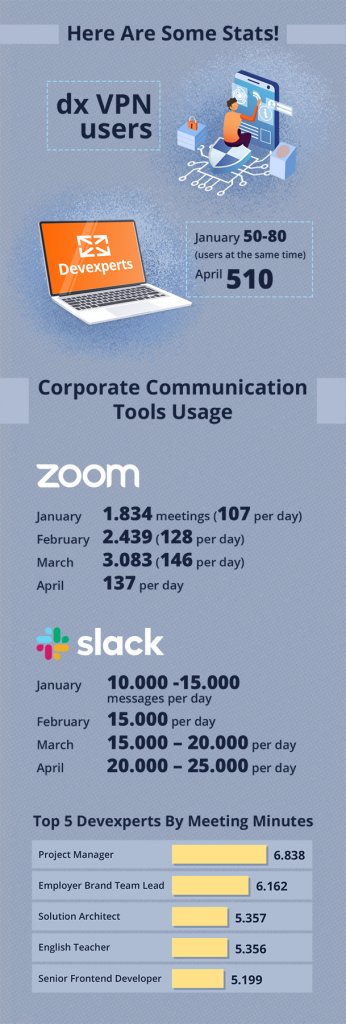Work from Home Principles during a Pandemic
In our new world under lockdown, companies are scrambling to convert their businesses to a WFH style of communication and collaboration. At Devexperts, we have a distributed network of teams all around the world. So we are no stranger to this environment. In recent weeks, we have directed our efforts toward expanding this WFH style to encompass our entire network of talented teammates and valued clients. To do this, we have put together a comprehensive work from home guide not only for us but for everyone experiencing this paradigm shift happening all over the world.
The Right Tools for the Job
Staying connected is vital to any WFH operation. Without the right tools, everything falls apart—the tried and true winners: Slack for messaging and Zoom for video calls. In February, we were sending around 10 000 – 15 000 messages per day via Slack, whereas in April, we’ve increased that number to 20 000 – 25 000 messages. As for Zoom, the number of meetings increased almost two-fold (comparing the 1834 meetings conducted in January to the 3083 meetings done in March). These tools have become our lifelines to one another, and the feedback from our staff has been overwhelmingly positive.
In addition to keeping us connected, these tools have gifted us the opportunity to launch online classes with various activities: yoga, stretching, cooking, painting, language practice, and a variety of online IT events for our colleagues. These tools offer outlets for new forms of creative thinking, and we have an open-door policy with our colleagues to encourage the sharing of ideas and resources. In a world so physically separated, we have been able to come together through technology and a motivation to keep one another engaged both in and out of work.

Connection Is about Flexibility and Support
People are not made to be alone. That is why, together, with the help of our colleagues, we have explored the essential ingredients to achieving a happy and balanced WFH lifestyle.
- Routine: Having to do something versus having to be somewhere is not the same. If you have to do something on a day, it can be done anytime. If you have to be somewhere—you can’t suddenly remember and show up at 11:30 PM because you were distracted by Netflix for six hours. Because of this, a routine is essential. There is a time to work and a time to stop working. Be available during working hours, hold yourself accountable in responding to messages, stay active in group chats, use video conferencing to stay connected, and take productive breaks: stretching, self-education, etc.
- Environment: Set up an at home work station: comfortable chair, no distractions, away from others. Establish rules with family members, and when you are finished work, don’t touch this station.
- Understanding: Not everyone is used to a WFH environment. Both managers and teammates must be patient with each other. The tone of messages can get lost in digital communications. If there is a misunderstanding: stop, consider the situation, and, if you are still concerned, set up a 1:1 meeting with a colleague or a manager.
- Community: It has become a flagship mission of ours to support our colleagues both in and out of work: casual online meet-ups, trivia nights, karaoke, competitions, creative experiments; we encourage everyone to foster these outlets. These are opportunities for all of us to connect in ways we would never have been able to in the workplace. Be open to new ideas, new experiences, and new connections.
- Trust: Without trust, a WFH environment quickly becomes a house of cards. Communities are made up of teams, and these teams are colleagues, co-workers, and sometimes friends. These individuals make up the foundation of any company, and we put our faith in them. A proper WFH environment is not about control, micromanaging, or top-down management. It is about believing in your employees and colleagues.
With years of experience in a WFH environment, rather than destroying our various workplace communities, this crisis has only expanded our larger virtual one. As a software provider, we know that everything evolves, and we are proud of the way our community has adapted to these times. With discipline, empathy, and the right tools for the job, we can all come out of it stronger and more connected than ever.